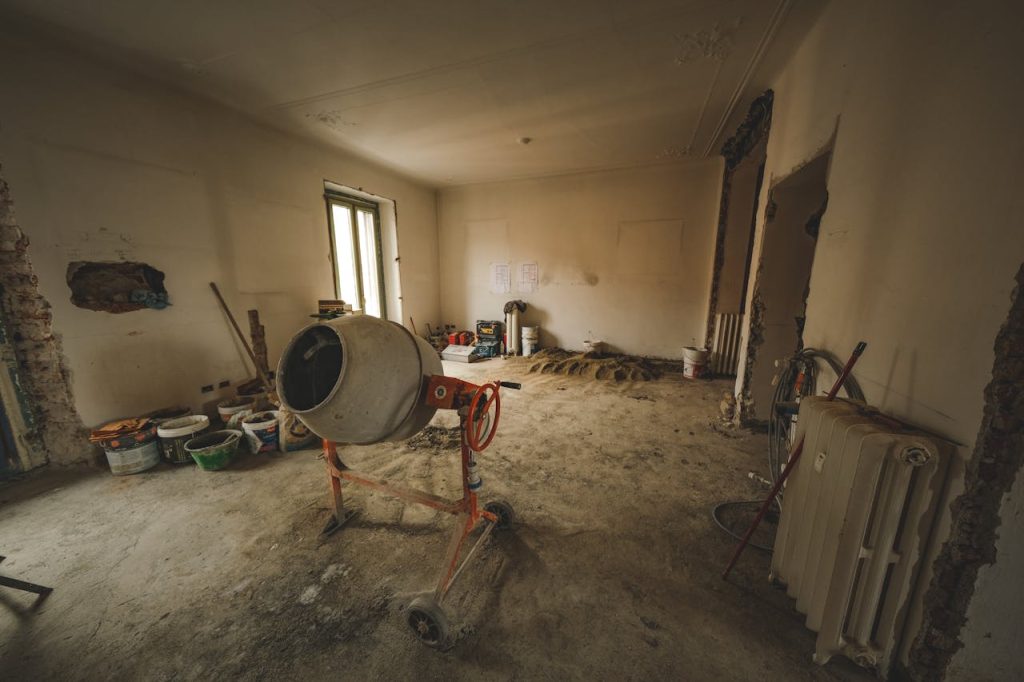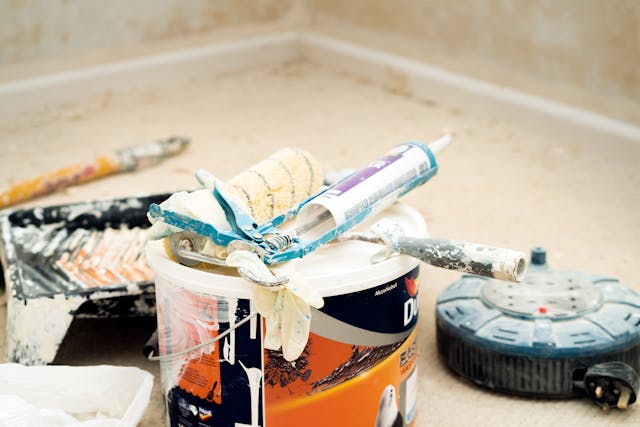Assess the Condition of Your Home
Think of it as a health checkup for your house—identifying the good, the bad, and the fixable. Knowing the issues in advance helps you decide on repairs. It also prepares you for questions from potential buyers. Whether it’s a leaky faucet or a foundation crack, knowing what you’re working with is the first step toward a successful sale.
- • Check Your Home's Condition
Check plumbing, electrical systems, and roofing for issues. Is there peeling paint, outdated wiring, or a stubborn leak? - • Common Issues in Older Homes
You might encounter issues like creaky floorboards, leaky pipes, or energy-inefficient windows. These are typical for aging properties but can influence buyer interest and price. - • Consider a Pre-Sale Home Inspection
An inspector can find hidden problems. You'll know what needs fixing. It can also cut unexpected findings during the buyer’s inspection.
Pro Tip: Not all repairs are worth it. Focus on cosmetic fixes or glaring issues that might scare off buyers.
Understand the Market for Fixer-Uppers
You may be surprised to learn there’s a healthy market for homes that need work. Some buyers see potential, whereas others see problems. Fixer-uppers have their charm, often attracting buyers looking for potential rather than perfection.
Who Buys Fixer-Uppers?
- • Investors: Real estate investors and house flippers are often drawn to fixer-uppers. They’re experienced in renovations and aim to turn a profit by flipping or renting out the property.
- • DIY Enthusiasts: Some buyers relish the challenge of transforming a home into their dream space. They’re often willing to put in sweat equity to customize the property to their liking.
- • Budget-Conscious Buyers: Fixer-uppers have a lower price. They attract buyers who want a home but can't afford a move-in-ready property in a competitive market.
- • Developers: In areas with high land value, developers may buy older homes intending to demolish and rebuild. For them, the existing structure is less important than the lot’s location.
Location Matters
- • Desirable Areas: In sought-after neighborhoods, even fixer-uppers can attract buyers due to their appeal. A fixer-upper is more attractive if it's near good schools, transit, and amenities.
- • Emerging Markets: Neighborhoods undergoing revitalization or gentrification often see increased interest in fixer-uppers. Buyers expect property values to rise as the area develops. So, they find renovation investments more appealing.
- • Local Regulations: Understanding zoning laws and historical preservation guidelines is crucial. Some areas may have restrictions that affect renovation plans. This can hurt the property's potential and appeal.
Fun Fact: A charming “diamond in the rough” near a bustling downtown can fetch a better price than a fully renovated home in the middle of nowhere.
Pricing a House That Needs Repairs
Getting the price right is where the rubber meets the road. Pricing a house in a less-than-perfect condition can feel like a balancing act. You’ll need to factor in the cost of repairs, market trends, and comparable sales to land on a fair number. The right price not only attracts buyers but also ensures you’re not leaving money on the table.
- • Consider Comparable Sales
Look at recent sales in your area, but be realistic about how your home stacks up. A well-maintained property down the street might not be your best comparison. - • Adjust for Repairs
Take into account the expenses for any essential repairs or upgrades. A buyer will use this to negotiate, so beat them to the punch by pricing accordingly.
Example: If nearby homes are selling for $400,000, but your property needs $50,000 in repairs, pricing it at $350,000 could be fair.
Consider Selling As-Is vs. Repairing Before Sale
Sometimes the smartest move is to leave the hammer and nails alone. Deciding whether to sell your house as-is or tackle repairs first can feel like a game of weighing pros and cons. While fixing certain issues might boost your sale price, selling as-is saves time, money, and effort.
Understanding the potential return on investment for repairs is key to making the right choice for your situation.
- • Advantages of Selling As-Is
No repair costs, faster sales, and less stress. This approach is ideal if you’re short on time or resources. - • When to Make Repairs
If small fixes can boost your property’s appeal and value, it might be worth the effort. Repairs like painting, landscaping, or fixing broken windows can make a big difference without breaking the bank.
Renovation ROI Tip: Kitchen and bathroom upgrades have the best ROI. But you must afford the high upfront costs.

Exploring Options: Selling to Investors and Cash Buyers
Offering as-is property doesn’t mean you’re stuck waiting for months. Selling to investors or cash buyers offers a quick and hassle-free way to move on from a home that needs work. These buyers prefer speed and potential over perfection. So, they're ideal for properties needing major repairs.
- • Why Investors Love Fixer-Uppers
Cash buyers and investors seek properties to update and resell for a profit. They appreciate the convenience of as-is sales and are less likely to haggle over minor issues. - • The Perks of Cash Offers
Quick closings, fewer contingencies, and less paperwork. Companies like John Buys Bay Area Houses specialize in these deals. They offer speed and simplicity.
Marketing Your Fixer-Upper to the Right Audience
Even a home in need of repairs deserves the spotlight. A house that needs work has its charm—if you know how to showcase it. By highlighting its potential and targeting the right buyers, you can turn "needs repairs" into a "dream opportunity."
Highlight the Potential
- • Showcase the Bones
Focus on the home's structural integrity, unique architectural details, or layout flexibility. Buyers appreciate solid foundations and well-designed spaces that can be customized.
- • Location is Key
Emphasize proximity to amenities like schools, parks, or transit. Even a fixer-upper in a great area can shine when you highlight its surroundings.
- • Opportunity Await
Sell buyers on a vision. Present the property as a blank canvas for their dream home or a long-term investment.
Effective Online Listings and Staging Ideas for Fixer-Uppers
- • Professional Photography: Use quality photos. They will show the property's best features and hide its flaws. First impressions are made online.
- • Write a Compelling Description: Use positive language to show the home's potential. Say things like, "Ready for your vision," or "Bring your creativity." Avoid focusing too much on what is wrong.
- • Virtual Tours: For buyers unable to visit, a virtual tour can help. It makes the home more accessible and shows its potential.
- • Budget-Friendly Staging: Arrange minimal furniture and decor to highlight functional spaces. A few well-placed items can help buyers envision a finished product. They won't break your budget.
Pro Tip: If staging isn’t in the budget, virtual staging can provide similar results for less.
Handling Negotiations and Closing the Deal
Closing the sale of a fixer-upper comes with its own set of challenges, especially during negotiations. Being prepared to address buyer concerns and repair requests can help you secure a deal that works for both sides. This stage can make or break your sale, so be prepared.
- • Expect Lower Offers
Buyers looking at fixer-uppers typically expect a deal. Understand your minimum acceptable offer and be prepared to negotiate confidently. - • Navigating Repair Requests
Some buyers may still ask for repairs after their inspection. Decide upfront what you’re willing to address—or use it as a negotiating tool to adjust the price. - • Closing with Investors vs. Traditional
Investors often make the process smoother with cash offers. However, traditional buyers may require contingencies and longer timelines.
Conclusion: Ready to Take the Next Step?
Selling a home that needs work doesn’t have to be stressful. Whether you decide to tackle a few repairs or list the property as-is, the key is finding the right buyer and price. For a quick, hassle-free experience, consider John Buys Bay Area Houses. They make the process straightforward and efficient.
Remember, every old home has a story—make yours the next chapter in someone else’s life.
FAQs about Sell an Old House That Needs Work
Should I sell my house as-is or make repairs before selling?
It depends on your budget and timeline. Small repairs can boost appeal, but selling as-is is often faster and less stressful.
How do I price a house that needs significant repairs?
Consider the cost of repairs, market trends, and comparable properties. Pricing fairly can attract serious buyers.
What type of buyer is most interested in a fixer-upper home?
Investors, house flippers, and buyers looking for a bargain or a project are the most common.
Is it possible to receive a cash offer for a house that requires repairs?
Absolutely! Many cash buyers, like John Buys Bay Area Houses, buy properties as-is.
What should I expect during a home inspection for a fixer-upper?
Expect the inspector to focus on structural, plumbing, and electrical issues. Transparency is key, so be ready to discuss repairs with potential buyers.



